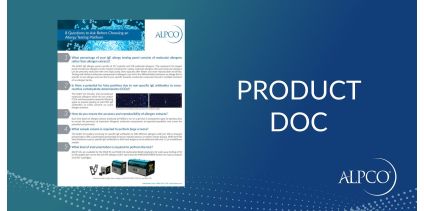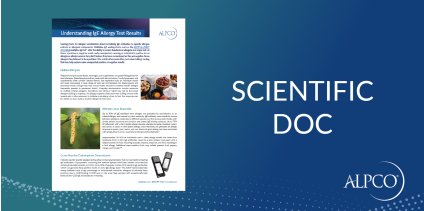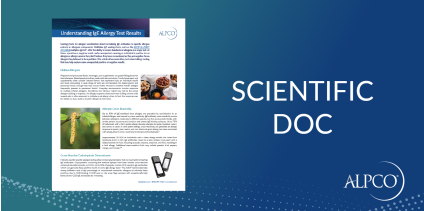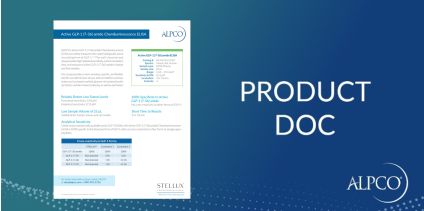Monkey NGAL ELISA
$2,146.00
Catalog
54-045
The Monkey NGAL ELISA is manufactured by BioPorto Diagnostics and intended for the determination of NGAL in Rhesus (Macaca mulatta) or Cynomolgus (Macaca fascicularis) urine, plasma, serum, tissue extracts, or culture media. Research Use Only. Not for Use in Diagnostic Procedures.
Species
Non-Human Primate
Regulatory Status
Research Use Only. Not for Use in Diagnostic Procedures.
Product Distribution
Available in North America Only
Range
10 - 500 pg/mL
Sensitivity
1.5 pg/mL
Sizes
96 Wells
Sample Types
Cell Culture, Plasma, Serum, Tissue Culture, Urine
Inc Time Hour
3
Inc Time Minute
15
Inc Time Overnight
No
Inc Time See Protocol
No
Sample Size
10
Detection
Colorimetric
NGAL (neutrophil gelatinase-associated lipocalin) belongs to the lipocalin family of proteins. These are small secreted proteins characterized by their ability i) to bind small hydrophobic molecules in a structurally conserved pocket formed by ß-pleated sheet, ii) to bind to specific cell-surface receptors, and iii) to form macromolecular complexes. NGAL has many synonyms: perhaps the most widely used is lipocalin-2 (LCN 2); more recently the name siderocalin has been used to express NGAL’s ability to bind bacterial siderophores. As NGAL was first reported as oncogene 24p3 in the mouse, this name is still occasionally used to identify NGAL in other species.
Because Rhesus monkey NGAL has not yet been isolated and no antibodies or immunochemical detection methods have hitherto been developed to detect or measure it, there are no published data on the physiological or pathological functions of this protein. However, it is likely that some features of the biosynthesis, location and release of Rhesus monkey NGAL will be similar to those of its homologues in other species, particularly man. The present kit has in fact been developed to extend NGAL research and the use of NGAL as a marker molecule, especially for kidney injury, to the Rhesus and closely related Cynomolgus monkey. In the following, some pathophysiological features of NGAL in humans and other mammalian species will be mentioned, because these two monkey species may show similar features. In some situations, NGAL may be co-expressed with matrix metalloproteinase-9 (MMP-9), but whether Rhesus monkey NGAL forms a complex with this enzyme is unknown, given that, unlike its human homologue, it does not possess a third cysteinyl residue capable of forming an intermolecular disul_x001F_fide bridge with the enzyme.
In other mammals, NGAL is expressed in neutrophil polymorphonuclear leucocytes and at lower basal levels in various other cell types, tissues or organs. These include epithelial cells of the uterus, mammary gland, lung, spleen, vagina and epididymis. It may be expressed in additional cell types during embryonic development and in response to various stimuli. This applies to certain kidney cells (see below), LPS-stimulated macrophages, dexamethasone-stimulated L-cells, and _x001F_fibroblasts stimulated with basic fibroblast growth factor. In the mouse, NGAL (often called 24p3 or uterocalin) is a type-1 acute-phase protein, being secreted by hepatocytes in the in-vivo turpentine model or in response to TNF-a or dexamethasone in vitro. In disease, NGAL may be moderately raised in bacterial infections because of release from activated neutrophils or from epithelial cells. It may also be moderately raised in atheroma and the ailing myocardium, and in certain epithelial cancers such as those of the mammary gland, gastrointestinal tract or urothelium.
Because Rhesus monkey NGAL has not yet been isolated and no antibodies or immunochemical detection methods have hitherto been developed to detect or measure it, there are no published data on the physiological or pathological functions of this protein. However, it is likely that some features of the biosynthesis, location and release of Rhesus monkey NGAL will be similar to those of its homologues in other species, particularly man. The present kit has in fact been developed to extend NGAL research and the use of NGAL as a marker molecule, especially for kidney injury, to the Rhesus and closely related Cynomolgus monkey. In the following, some pathophysiological features of NGAL in humans and other mammalian species will be mentioned, because these two monkey species may show similar features. In some situations, NGAL may be co-expressed with matrix metalloproteinase-9 (MMP-9), but whether Rhesus monkey NGAL forms a complex with this enzyme is unknown, given that, unlike its human homologue, it does not possess a third cysteinyl residue capable of forming an intermolecular disul_x001F_fide bridge with the enzyme.
In other mammals, NGAL is expressed in neutrophil polymorphonuclear leucocytes and at lower basal levels in various other cell types, tissues or organs. These include epithelial cells of the uterus, mammary gland, lung, spleen, vagina and epididymis. It may be expressed in additional cell types during embryonic development and in response to various stimuli. This applies to certain kidney cells (see below), LPS-stimulated macrophages, dexamethasone-stimulated L-cells, and _x001F_fibroblasts stimulated with basic fibroblast growth factor. In the mouse, NGAL (often called 24p3 or uterocalin) is a type-1 acute-phase protein, being secreted by hepatocytes in the in-vivo turpentine model or in response to TNF-a or dexamethasone in vitro. In disease, NGAL may be moderately raised in bacterial infections because of release from activated neutrophils or from epithelial cells. It may also be moderately raised in atheroma and the ailing myocardium, and in certain epithelial cancers such as those of the mammary gland, gastrointestinal tract or urothelium.







